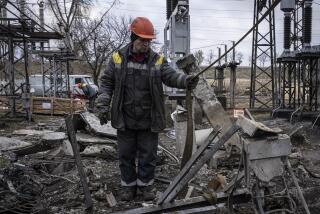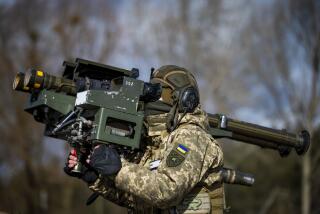‘A Fine Winter!’ : Muscovites Thriving on Bitter Cold
- Share via
MOSCOW — Twenty inches of snow had fallen during the week, the temperature was 14 degrees and the skies were threatening.
“A fine winter!” shouted a man on skis, his joyous salute emerging in a cloud of instant frost. Like most Muscovites, he had the earflaps raised on his fur hat in defiant disregard of the cold.
His was not a lone voice. Almost unanimously, Russians have welcomed the return of ice and snow, even though it means hardship for them.
“Good for bread,” they say, reflecting a widespread belief that heavy snow will bring a good harvest the following autumn.
Little Grain Produced This may be only folklore, but the last three “rotten winters”--with mild temperatures and snow that quickly turned to slush--have been followed by disastrous grain crops in the Soviet Union.
Many Muscovites believe that germs and illness multiply when winter weather turns warm. Besides, they seem to thrive on snow and cold--turning out in great numbers with skis, skates and sleds.
In parks and fields, surrounded by white birch and snow-frosted evergreens, city dwellers can rediscover nature’s wonders. Skating is possible on 300 frozen ponds and 3,000 neighborhood rinks. Gorky Park has a lighted skiing area, stretching for miles along the Moscow River, and sleigh rides behind a team of three horses--the original Soviet troika-- are available in another large recreation area.
Hardy swimmers can plunge into Moscow’s huge outdoor swimming pool. It is open year ‘round, with steam rising from its heated water in the winter. Members of “walrus clubs” chop holes in iced-over lakes. Their slogan: “The colder the better.”
Still, winter brings discomfort as well as delight. The millions of bus passengers may have the worst of it as subfreezing cold puts some buses out of action and snow-filled streets delay those buses that keep running.
As a result, hundreds of people may wait at a single bus stop--pushing, shoving and cursing in desperate efforts to get aboard. The subway, by contrast, is a cozy retreat from the cold for 6 million daily passengers.
“The Russian winter doesn’t joke,” a news commentator remarked after three blizzards in a week dumped more than 20 inches of snow on Moscow, approaching the record of 25 inches for the month of January that was established in 1956. It costs the city about $30 million to get rid of the approximately five feet of snow that falls each winter.
At major intersections, older women in head scarves and dark overcoats shovel and scrape ice from streets and sidewalks. Often, men driving snowplows and dump trucks watch these babushki from the relative comfort of their vehicles’ heated cabs. Moscow Pravda, the city’s Communist Party newspaper, recently complained that half the truck drivers disappeared for two or three hours--presumably making private deliveries on the sly--and snarled the snow-removal process.
Special squads go up to roofs of buildings to knock down enormous icicles that would otherwise pull down rain gutters or fall at random to sidewalks below, endangering pedestrians. While the women sweepers warn passers-by, the icicles hit the ground with a crash.
Steady subfreezing cold also causes problems for car owners, who are constantly plagued by start-up problems. When the temperature dips toward zero, many motorists remove their batteries and recharge them in their apartments to make sure that they can start their cars the next morning. There is a battery shortage in Moscow, and it might take months to get a new one.
When the temperature rises, melted snow threatens to rust out car bodies. It is not surprising that about half Moscow’s private car owners put their cars in mothballs and take the subway or bus on winter days.
Residents of Moscow’s 3 million apartments get their heat from central boiler rooms that produce super-hot water for radiators. The average customer, according to city officials, pays the equivalent of $2.80 a month for heat and hot water. If there is a breakdown, however, the hot water may be shut off for as long as a month.
City officials say they have more complaints about the cold when the temperature is about 14 degrees than when it drops below zero. This is because winds blow more strongly when temperatures are in the teens, an official said, adding, “Not many tenants are very conscientious about conserving heat.”
Outside, Muscovites bundle up against the cold. Standard winter dress includes a bulky fur hat, heavy overcoat and boots. In recent years, many people have acquired more expensive hats, fur or leather coats and, for women, more stylish boots. Children, especially infants, are bundled up so that often little more than their eyes and noses are visible.
For some reason, men apparently make it a point of honor to keep their ears uncovered in winter unless the cold is severe. When the mercury plunged to 7 below zero last month, though, everyone was tugging at the earflaps.
There are some concessions to the cold. Felt-booted traffic police, for example, work shorter hours and have access to warming stations in winter. Soldiers selected to guard Lenin’s Tomb, normally on duty for an hour, stay only 20 minutes when the temperature drops below 14 degrees.
In Red Square the other day, an old woman who was accepting payments for photographs of tourists was asked how she tolerated the freezing weather.
“It’s not cold,” she said, while wearing two overcoats. Even cashiers in stores frequently wear fur hats, mufflers and overcoats to ward off the chill.
In winter, fresh vegetables and fruit are hard to come by, even in Moscow, which as a “hero city” of World War II gets a priority in such matters. Government stores rarely have any green vegetables, except cabbage, and occasional shipments of oranges swiftly sell out. At the private market, where prices are not controlled, cucumbers may sell as high as $16 a kilogram, or $7.25 a pound. Pears at the same market cost the equivalent of a dollar each.
However, there never seems to be a shortage of ice cream--a popular delicacy even in wintertime.
Usually, there are five months of snow and cold before spring arrives in late March.
The city fathers have an iron rule: If the temperature stays above 47 degrees for five days in a row, the heat is turned off. Winter is officially over.
More to Read
Sign up for Essential California
The most important California stories and recommendations in your inbox every morning.
You may occasionally receive promotional content from the Los Angeles Times.













